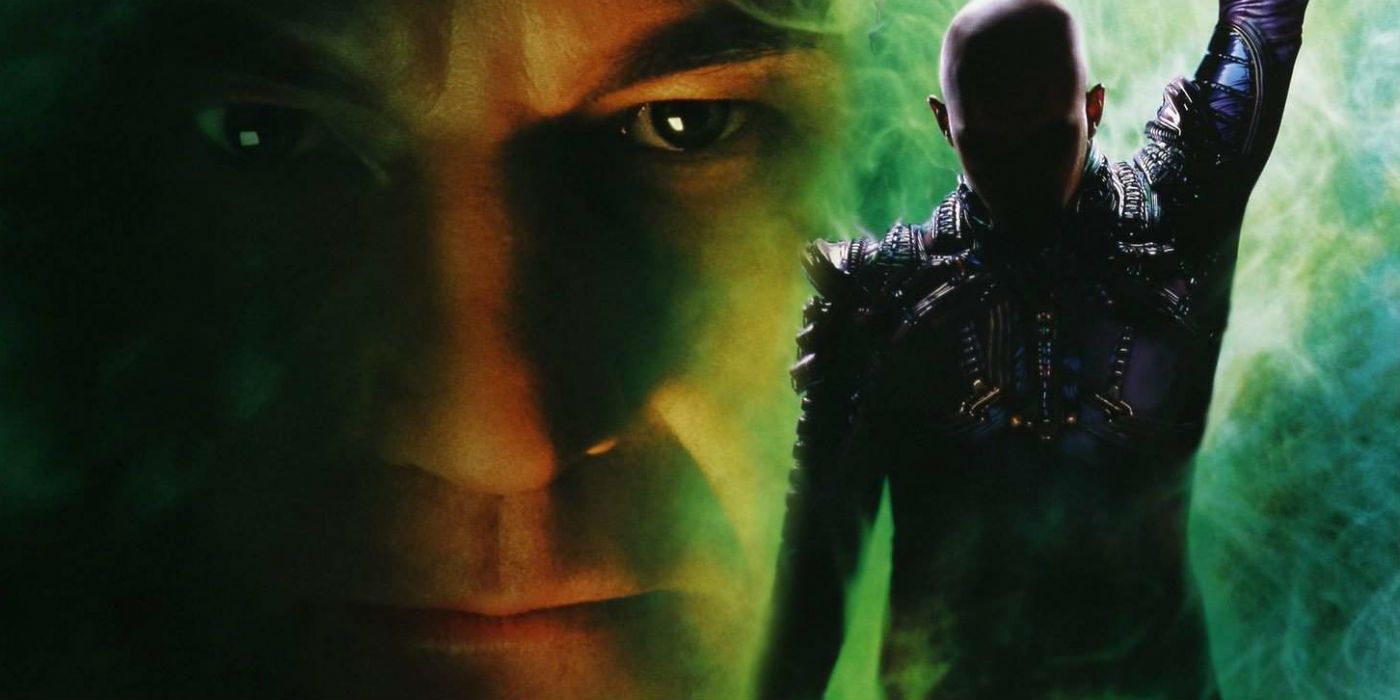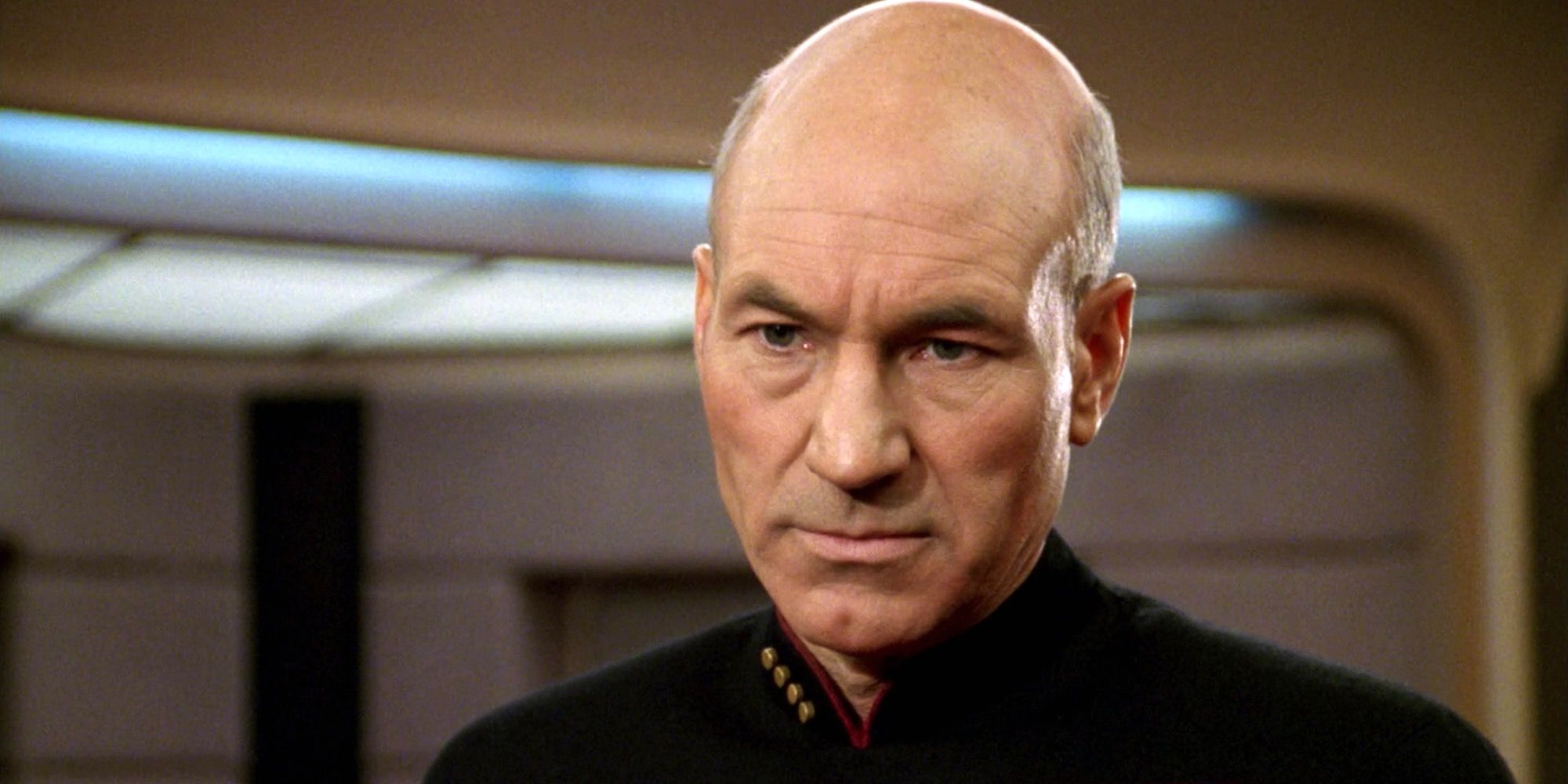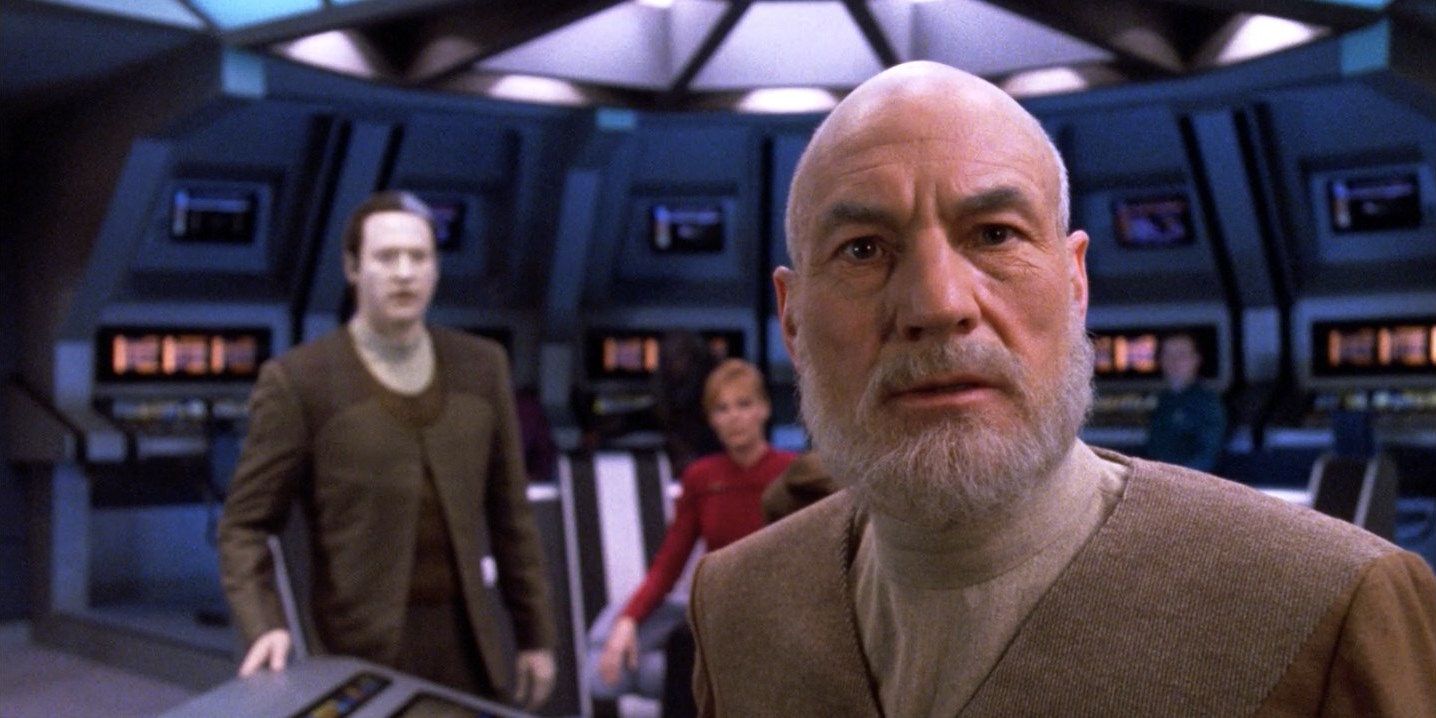Now that we know Jean-Luc Picard is returning to Star Trek, it's worth revisiting where we last left the good captain. Following rumors of a return to the sci-fi franchise, Patrick Stewart stunned the crowd at the Star Trek Las Vegas Convention by announcing he will be putting his Starfleet uniform back on to tackle the iconic character he portrayed over seven seasons on Star Trek: The Next Generation, and in four followup feature films. Stewart will be playing an older version of Picard for a CBS All Access series; details at the moment are slim, but Stewart promised something radically different for the character, and suggested he's likely no longer in the captain's chair on the Enterprise.
This is a deliriously exciting development for a lot of reasons. The first, and most obvious, is that Picard is one of the franchise's most enduring, beloved characters, shoulder to shoulder with the likes of Captain Kirk and Spock, perhaps even more so for the generation of fans who grew up with The Next Generation in constant syndication. Stewart is one of the most beloved actors in the Star Trek franchise, and there's a visceral joy in the prospect of seeing him play Picard again that's impossible to deny. This will also presumably be the franchise's first visit to the Prime timeline that actually pushes past the events of Nemesis; the Chris Pine-starring films take place in an alternate reality known as the Kelvin timeline, and Star Trek: Discovery is a prequel to The Original Series.
Related: Patrick Stewart Returning as Picard in New Star Trek TV Series
But perhaps most of all, this feels like a time when we need Picard. In an era that has seen the rise of increasingly heated and bigoted rhetoric, bad faith debates, and blatant anti-intellectualism, the cerebral, empathetic Picard feels like a balm - a notion Stewart himself acknowledged. The best versions of Star Trek have always been loaded with social commentary, that optimistic belief that humanity will eventually better itself by overcoming its darker impulses and embracing egalitarianism and and benevolent exploration. No single character embodied those ideals more than Picard.
- This Page: Where Picard's Story Left Off
- Page 2: What Could Lie in Picard's Future
Where We Left Picard
Picard's last canonical appearance was in the 2002 film Star Trek: Nemesis. Nemesis suffered from waning interest in the franchise, a largely unimaginative plot, and a director who had an almost comedically hostile attitude toward the franchise in Stuart Baird (he infamously referred to Geordi LaForge actor LeVar Burton as "Laverne" on more than one occasion). The film was met with hostile reviews and failed at the box office, abruptly ending the story of the Next Generation crew.
Perhaps sensing the end was near, Nemesis did manage to wrap up several long running storylines for its core cast of characters. Commander Riker (Jonathan Frakes) and Counselor Troi (Marina Sirtis) were finally married in a service officiated by Picard. Riker and Troi departed the Enterprise at the end of the film, as Riker took command of the USS Titan, leaving Picard without his longtime first officer. Dr. Beverly Crusher (Gates McFadden), Picard's oldest friend and occasional love interest, departed the Enterprise to head Starfleet Medical on Earth. Lieutenant Commander Data (Brent Spiner) sacrificed himself to save Picard from his own evil clone, Shinzon (played by a very young Tom Hardy). At film's end, Picard's surrogate family had mostly left him behind, with only LaForge and Lieutenant Commander Worf (Michael Dorn) remaining on the Enterprise. Frankly, Picard and his crew deserved a much better ending than what Nemesis offered them.
While Nemesis was the last time we saw Picard onscreen, there are likely plenty of hints about Picard's future in the IDW comic book Star Trek: Countdown. Released in 2009, Countdown served as a bridge between the Next Generation era and J.J. Abrams' alternate universe films featuring Kirk and Spock. Set eight years after the events of Nemesis, the comic saw Picard as the Federation Ambassador to Vulcan, with a revived Data now in command of the Enterprise. Whether or not Countdown is canonical has long been up for debate, but it was plotted by Roberto Orci and Alex Kurtzman, who wrote the first two Abrams films. Kurtzman oversees all of CBS All Access' Star Trek productions, and is said to be intimately involved in the development of the new Picard series.
Page 2: What Could Lie in Picard's Future
What Could Lie in Picard's Future
Most alternate reality and time traveling episodes of Star Trek: The Next Generation line up with Countdown's assertion that Picard would eventually be promoted to admiral and then take on an ambassadorship. That makes perfect sense; The Next Generation positioned Picard as the Federation's most skilled diplomat, a man who had an uncanny ability to bring hostile entities together in peace. It would also echo the show's much beloved series finale, "All Good Things," which showed a glimpse of a possible future where a retired Ambassador Picard was grappling with the effects of Irumodic Syndrome - essentially a future form of Alzheimer's disease - and reflecting on the choices he'd made in his life.
There would also be an opportunity to redeem at least some aspects of Nemesis. That movie's climax saw the possible thawing of the long cold war between the Federation and the Romulans. From Abrams' first Star Trek film, we know Romulus itself was destroyed less than a decade after the events of Nemesis by a supernova, mirroring Nero's destruction of Vulcan in that film's alternate timeline. The mistrustful, scheming Romulans would likely have difficulty finding allies as an endangered species in the wake of their planet's destruction. Picard would be a natural choice to try and help his longtime enemies in their darkest hour.
Related: Star Trek Discovery Getting Short-Form Spinoff on CBS All Access
Nemesis also subtly hinted at the quiet tragedy of Picard's life, that he never had a family or friends outside of his command, something that could very well haunt him at the end of his life. The new series will see a much older Picard, and it's certainly possible he could be grappling with those issues since he no longer sits on the bridge of the Enterprise. The possibilities for a Picard in his twilight years are endless, but it seems likely that whatever he finds himself doing, it will be colored with a twinge of sadness.
-
For many longtime fans, Star Trek has been lost as a franchise for two decades. The Abrams films are fun, entertaining action films, but they're decidedly light on the social commentary and headier ruminations that were once the trademark of the series; they owe more to the likes of Star Wars and even The Fast & The Furious than they do, say, The Undiscovered Country. Star Trek: Discovery was hailed as the series' long awaited return to both television and the main timeline, but it too has felt like a half measure in many ways; its first season suffered from some severe prequelitis issues - like focusing on Spock's never-before-mentioned human sister - and embraced the sort of amorality and graphic violence that are currently all the rage in shows like Game of Thrones and The Walking Dead, but which are anathema to the progressive, idealistic vision of the future Star Trek has always promised.
The Picard series feels like the clearest opportunity yet to revisit the version of Star Trek that people romanticize, where good men and women take on the darkness with wide eyes and full hearts. Particularly right now, there's no greater character to show us that humanity can still steer itself through dark times with intellect and understanding than Jean-Luc Picard.



